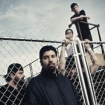"Heavy music as a genre has become so bastardized into focusing on, 'Meh, I'm angry!'" says Lauren Kashan, lead singer and lyricist of melodic hardcore upstarts Sharptooth. "Cool fucking story, bro. What are you gonna do about it?"
Kashan, who's warm, funny and curses a fuck ton, is in a U-Haul, moving from her hometown of Baltimore to a new place in Boston. She tells me about one of the tracks — tentatively called "The Gray" — on Sharptooth's forthcoming, as-yet-untitled sophomore record. "A lot of times we put ourselves into boxes," she explains of its theme. "If you sit around telling yourself that you act or feel a certain way because it's the thing you've always done or always felt — how are you supposed to grow from that? That just sounds like a place of stagnation to me."
Kashan has spent much of her life pushing boundaries and breaking out of boxes — in other words, doing something about shit, not just getting angry about it. She's spoken candidly about her past issues with drugs, being raped and her involvement in an abusive Florida treatment center that's been cited multiple times for malpractice by the Florida Board of Medicine. She was admitted there at 19 and soon realized it was "legitimately a cult" that cut off its patients from friends and family. Kashan fought her way to release and traveled back home to Baltimore, where she eventually found catharsis for her painful experience at hardcore shows. "That was a place where I felt like I was finally allowed to express feelings I was never allowed to express," she says. "I hope that people can find some of that in what we're trying to do."
Power and individual agency are major themes for Sharptooth, which the singer explores on the new record, tentatively scheduled for release this fall via Pure Noise Records, and on 2017's debut full-length, Clever Girl. Kashan feels empathy and nuance are both "sorely lacking in a lot of our public discourse" these days. She's pissed off by what she calls "emotional laziness," when people don't want to worry about other people's problems. Sharptooth's songs aim to imbue hardcore with a furious compassion that Kashan feels is largely missing from the landscape. Following in the footsteps of iconic political punk bands like Crass, Against Me! and Minor Threat, it's not just Kashan's personal traumas that inspire Sharptooth's songs about the world's ills. Sexual violence, misogyny and addiction are strongly addressed on Clever Girl, but so is homophobia, systemic racism, government corruption and climate change. Whether on record or through their chaotic live shows, opening for everyone from Anti-Flag and Senses Fail to Cane Hill and Jesus Piece, Sharptooth aim to shake people out of complacency and into action.
As it turns out, Kashan's ideas about personal and societal evolution aren't just rooted in punk politics and her own life experience; they're also informed by science. The singer received a degree in herpetology, the study of amphibians and reptiles, from Baltimore's Towson University in 2013, and worked at the National Aquarium after graduation. (She has a pet Dumeril's ground boa named Atari and a savannah monitor named Vinnie.) It's unsurprising, then, that one way she likes to think about the self is within a scientific framework — specifically, the concept of neuroplasticity, which is the brain's ability to adapt and change throughout a person's life. "It's kind of an insane concept for anyone to try to nail themselves down, because our brains are always changing," she says.
Her band is always evolving, too. Its biggest evolutionary step came when she joined in 2014. Guitarists Keith Higgins and Lance Donati, bassist Phil Rasinski and drummer Conor Mac were looking for a new vocalist, and knew Kashan through her avid participation in Baltimore's hardcore scene. But even though the singer adored music her whole life, she says she never seriously considered it as a career. She remembers boys in high school wouldn't even let her audition for their bands. She finally joined her first band at 21. "Not because it was particularly the type of music I was super into, but because it was the only option," she explains. "Pop punk and hardcore and all those genres were still being fucking assholes about it." So, when Kashan signed on with Sharptooth, it was with two stipulations: She wanted to play heavier music than they'd been making, and she wanted to write.

The band agreed and set out to recast their new weightier sound and vision. Central to the new approach are Kashan's powerful lyrics — rife with thoughts about oppression, social norms, misogyny and underrepresented voices — which the singer found fit perfectly among the fury and tenderness of melodic hardcore. Take Clever Girl's opening and closing tracks — "Rude Awakening" and "Pushing Forward" — for example, which are about struggling with her identity and finally finding healing through hardcore. "This is the place where I go to emote," she wails on both songs. And on the latter: "This is the place where I am finally free/The only place where I can say I'm finally me." Heavy music, she tells me, is for "the feelings that need to be screamed." And, ideally, those screams should serve as rallying cries.
Kashan sees potential in heavy music to be truly revolutionary. To her mind, all the screaming has to be for something in order to be useful. Sociopolitical hardcore, she says, is about "taking all those extremely angry feelings, that are justified, and saying, 'We need to mobilize. We need to become a united front.'"
"I have to give a shit, because if I don't, my fucking rights are gonna get taken away," she continues. "All of our rights are gonna get taken away, if we don't pay the fuck attention. A lot of times when I hear people say, 'Keep the politics out of music,' what I hear is, 'Keep marginalized voices out of music.' Really, it's just about our existence and how to make it better."
Part of the neuroplasticity idea is being able to learn and grow, and also unlearn and unteach yourself, to shatter the boxes you may have been caged inside. That's what Kashan has gained through music, and it's what she wants her music to help people do as well. "Something I strive to impart upon young people at the shows is, 'You can be here, presenting however the fuck you want to. You are just as worthy of this space as anybody else.'"
At the very least, she says, by playing shows, and singing about subjects like sexual violence and homophobia, people who have had those kinds of experiences will know they're not alone. "That's something I can do every single time I get onstage," she says. "If my band does anything, I would like to create spaces for conversations. Validation for people who have suffered. And opportunities for us to start talking about what comes next, and what's best for people. To feel like they can be able to heal."












